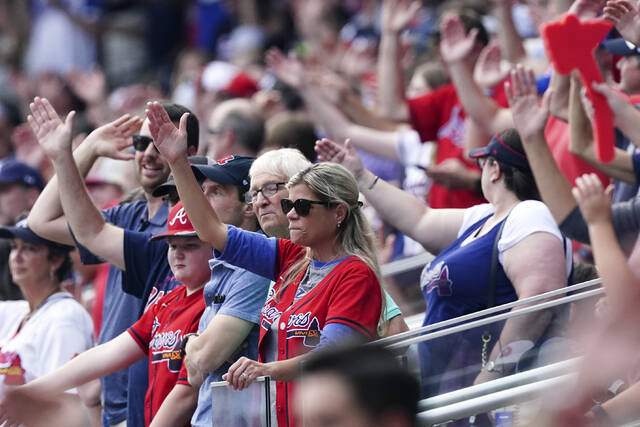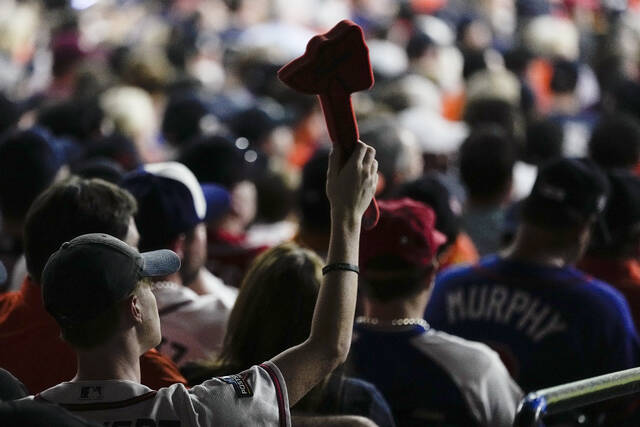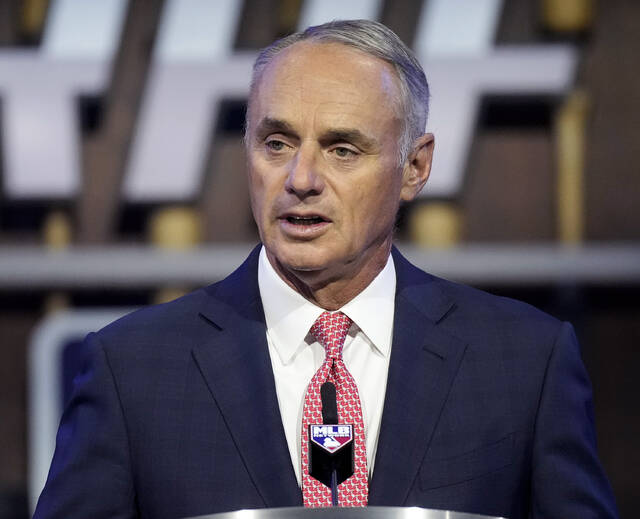


ATLANTA (AP) — The haunting chants will be impossible to ignore now that the World Series has shifted to Atlanta.
Get ready to step back in time — in a most unfortunate way.
While a good chunk of the world moves forward, the Braves are choosing to cling stubbornly to the past, hoping that any opposition to their nickname and the tomahawk chop will somehow just fade away, or at least get drowned out by 40,000 fans waving their arms and droning in unison like extras in a 1950s John Wayne flick.
Major League Baseball, which took the bold stance of yanking the All-Star Game out of Atlanta over the state’s new voting restrictions, suddenly looks about as progressive as Kenesaw Mountain Landis with its tortured defense of the team.
Yet this much is clear: There is no way this issue ever turns in a favorable direction for the Braves.
Not now. Not next season. Not a hundred years from now.
“This is an existential moment for the Atlanta Braves,” said James O’Rourke, a professor of management at Notre Dame’s Mendoza College of Business. “They need to recognize that this problem is not going to go away.”
Commissioner Rob Manfred tried to provide cover, but calling it “a local issue” and insisting that the support of a single tribe in North Carolina was all the Braves needed to carry on with business as usual only served to fan the flames.
Simply put, the Braves and their co-conspirator are on the wrong side of history, not unlike those who continue to defend the Confederate flag and statues as nothing more than peaceful symbols of Southern heritage.
No matter how many people attempt to stand in the way, as they always do when society makes a jarring but inevitable lurch forward, there’s no turning back now.
“We have repeatedly and unequivocally made our position clear — Native people are not mascots, and degrading rituals like the tomahawk chop that dehumanize and harm us have no place in American society,” said Fawn Sharp, president of the National Congress of American Indians.
Much of the sports world has heeded this message, if somewhat begrudgingly.
After insisting for years that it would not alter a nickname that is literally deemed offensive in the dictionary, Washington’s NFL team finally dropped its racist moniker.
The Cleveland Indians followed suit, changing their name to the Guardians heading into 2022.
Even the Braves, not known for being as socially progressive as Atlanta’s other sports franchises, seemed to be moving in the right direction during the 2019 playoffs when a rival pitcher, who happened to be a member of the Cherokee Nation, called the tomahawk chant insulting.
The team did not distribute red foam tomahawks before the decisive Game 5 of their NL Division Series “out of respect for the concerns” expressed by St. Louis reliever Ryan Helsley.
But when some Braves fans grumbled about the move, and even went so far as to claim it put a hex on the team that resulted in the Cardinals scoring 10 first-inning runs and ending Atlanta’s season, the suits in the front office quickly put the brakes on any tentative steps to drown out the chant.
It wasn’t really an issue during the pandemic-shortened 2020 season, when games were played in empty stadiums.
But with fans returning this season, the Braves just couldn’t bring themselves to break up with their beloved chop. They brought back the ritualistic music that sparks the cheer. They brought back video displays of swinging tomahawks throughout Truist Park.
While we’re at it, don’t even bother bringing up the issue of a name change with Braves ownership. That’s a non-starter, even though the 145-year-old franchise has gone through five other nicknames in its long history (Did you know they were known as the Bees in the late 1930s?)
The Braves insist their current nickname — which first dates to 1912 when the franchise called Boston home — is not offensive or demeaning to Native Americans, largely relying on the support of the North Carolina-based Eastern Band of Cherokee Indians.
There are few federally recognized tribes remaining in the Deep South — and none in Georgia — largely because most of the region’s Native Americans were forcibly removed in the early 1800s through the devastating “Trail of Tears,” which left thousands dead from starvation and disease.
But the Eastern Band of Cherokee Indians, remnants of the main Cherokee Nation that was forced westward, have become willing partners in the Braves’ scheme to keep their name, the tomahawk logo that adorns their jerseys, and the tomahawk chop used to cheer on the team.
It surely doesn’t hurt that Harrah’s Cherokee casino is a major sponsor of the Braves, even though Principal Chief Richard Sneed insisted the two issues are not at all related.
He said the group’s tacit support of the Braves nickname, logo and cheer is “an opportunity to bring awareness and shine a spotlight on the bigger issues that are facing the Indian country,” such as poverty, unemployment, substance abuse and mental illness.
Even though the Eastern Band of Cherokees are merely one of 576 federally recognized tribes across the country, Manfred said that’s good enough for him.
“The Native American community in that region is wholly supportive of the Braves’ program, including the chop,” said Manfred, who apparently missed the Trail of Tears section in his U.S. history class. “For me, that’s kind of the end of the story.”
Even more nonsensically, Manfred insisted that baseball is a sport marketed strictly as a local enterprise, with no national or international considerations. We presume that means there’s no reason for anyone outside of the Atlanta and Houston markets to watch the World Series — despite Fox spending billions on the national television rights.
“We don’t market our game on a nationwide basis,” Manfred insisted, which may explain why the national pastime appears to be dying on the vine.
Manfred’s blather notwithstanding, the Braves — or maybe we should just start calling them the Atlanta Baseball Club, ABC’s for short — would surely be best served over the long haul by eliminating all Native American imagery.
There would undoubtedly be some pushback from the Braves’ largely white fan base, but we’re betting the issue would quickly die away if the team — which has won four straight NL East titles — continues to excel on the field. And such a move would provide a huge opportunity to reach out to younger, more diverse groups.
“The people who embrace the old order are aging out of the demographic,” O’Rourke said. “The people you want to bring into the demographic are young people, who favor multiplicity, who favor a heterogeneous workplace, who favor diversity and inclusion and equity.”
It hurts for a minute whenever you rip off a Band-Aid, but the pain always goes away.
So let’s start ripping.
A new nickname? How about the Hammers, in honor of the franchise’s greatest player, Hank Aaron.
A new logo? A hammer, of course, which would fit nicely in that spot on the jersey currently occupied by the tomahawk.
A new cheer? Anything but the tomahawk chop.
___
Paul Newberry is a national sports columnist for The Associated Press. Write to him at pnewberry(at)ap.org or at https://twitter.com/pnewberry1963 and check out his work at https://apnews.com/search/paulnewberry
___
More AP MLB: https://apnews.com/hub/MLB and https://twitter.com/AP_Sports




